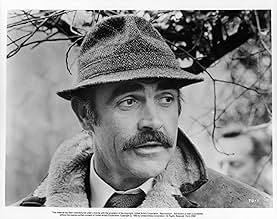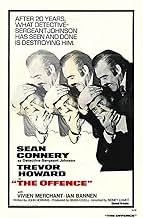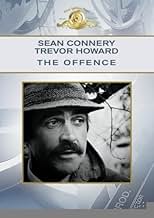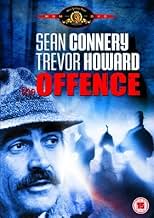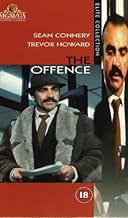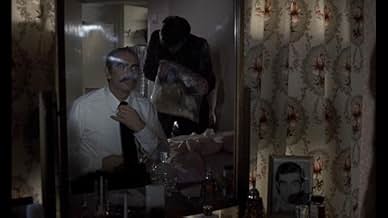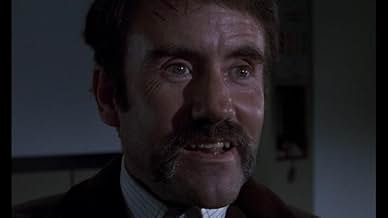VALUTAZIONE IMDb
6,9/10
8724
LA TUA VALUTAZIONE
Un detective della polizia britannica esausto finalmente scatta mentre interroga un sospetto molestatore di bambini.Un detective della polizia britannica esausto finalmente scatta mentre interroga un sospetto molestatore di bambini.Un detective della polizia britannica esausto finalmente scatta mentre interroga un sospetto molestatore di bambini.
- Nominato ai 1 BAFTA Award
- 1 candidatura in totale
John Cannon
- Police Constable
- (non citato nei titoli originali)
Les Conrad
- Detective
- (non citato nei titoli originali)
Timothy Craven
- Ambulance Man
- (non citato nei titoli originali)
Recensioni in evidenza
Sean Connery is more a superstar than an actor. Although his talents have been recognised by the Academy (for his rather unconvincing turn as an Irish cop in The Untouchables (1987)) and remembered for his role as the first James Bond, he is high up on his own pedestal, a gift for voice actors and one of the handsomest faces ever to have graced the screen. But anyone in doubt of his ability as a proper thespian need look no further than his grim, tormented portrayal of a cop who has seen one too many dead bodies in Sidney Lumet's The Offence, a huge flop at the box office and a film now faded into memory, ripe for a re-discovery.
Playing with time Rashomon (1950)-style, the film begins in slow motion, where an unknown disturbance at a police station has a few officers panicked. It is revealed to be Detective Sergeant Johnson (Connery) standing over the bloodied body of suspect Kenneth Baxter (Ian Bannen), with fellow police officers scattered on the floor. It then goes back, and we are in a grey, miserable city gripped in panic as a child-killing paedophile roams free. The latest disappearance of a young girl has Johnson riled, and officers cruising the street pick up Baxter, who is wandering alone in the night covered in mud. The young girl is found raped but alive by Johnson himself, who insists on spending some time alone with the suspect.
Based on John Hopkins' stage play This Story of Yours, Connery fought tooth-and-nail to adapt it for the big screen, eventually reprising his role as Bond in Diamond Are Forever (1971) in return for the green-light. Although the film consists of long, talky scenes, Lumet uses stylish editing in order to avoid being stagy and to delve further into his anti-hero's head. His reputation as a no- nonsense director betrays him here, as scenes of gruesome murders, body parts, and a host of other atrocities Johnson has witnessed flash before our eyes. The use of slow motion in the flashback moments also employs a sort of circular filter at the centre of the screen, reflecting Johnson's disconnection from his actions but getting slightly tiresome in the process.
There are three long, outstanding scenes. The first is Johnson returning home to his wife (Vivien Merchant) following his interrogation of Baxter, drinking heavily and exploding at the one person who could possibly help him. The second is Johnson's own interrogation with superintendent Cartwright (the ever-excellent Trevor Howard), a man who has witnessed the same level of horror himself, but has learnt to separate his work from his life, something Johnson is unable to do. The third is the extended interrogation of Baxter, where Bannen's creepy turn surely must have been an inspiration for the Joker-Batman verbal showdown in The Dark Knight (2008). It's incredibly bleak stuff, but the raw honesty of the script and performances makes this powerful stuff.
www.the-wrath-of-blog.blogspot.com
Playing with time Rashomon (1950)-style, the film begins in slow motion, where an unknown disturbance at a police station has a few officers panicked. It is revealed to be Detective Sergeant Johnson (Connery) standing over the bloodied body of suspect Kenneth Baxter (Ian Bannen), with fellow police officers scattered on the floor. It then goes back, and we are in a grey, miserable city gripped in panic as a child-killing paedophile roams free. The latest disappearance of a young girl has Johnson riled, and officers cruising the street pick up Baxter, who is wandering alone in the night covered in mud. The young girl is found raped but alive by Johnson himself, who insists on spending some time alone with the suspect.
Based on John Hopkins' stage play This Story of Yours, Connery fought tooth-and-nail to adapt it for the big screen, eventually reprising his role as Bond in Diamond Are Forever (1971) in return for the green-light. Although the film consists of long, talky scenes, Lumet uses stylish editing in order to avoid being stagy and to delve further into his anti-hero's head. His reputation as a no- nonsense director betrays him here, as scenes of gruesome murders, body parts, and a host of other atrocities Johnson has witnessed flash before our eyes. The use of slow motion in the flashback moments also employs a sort of circular filter at the centre of the screen, reflecting Johnson's disconnection from his actions but getting slightly tiresome in the process.
There are three long, outstanding scenes. The first is Johnson returning home to his wife (Vivien Merchant) following his interrogation of Baxter, drinking heavily and exploding at the one person who could possibly help him. The second is Johnson's own interrogation with superintendent Cartwright (the ever-excellent Trevor Howard), a man who has witnessed the same level of horror himself, but has learnt to separate his work from his life, something Johnson is unable to do. The third is the extended interrogation of Baxter, where Bannen's creepy turn surely must have been an inspiration for the Joker-Batman verbal showdown in The Dark Knight (2008). It's incredibly bleak stuff, but the raw honesty of the script and performances makes this powerful stuff.
www.the-wrath-of-blog.blogspot.com
10tully-2
This is a superb psychological thriller with a brilliant lead performance from Sean Connery.
Connery plays a police detective nearing burn-out, the fuse for which is provided by a child molester on the loose. When a suspect (Ian Bannen) is arrested, the detective takes it upon himself to interrogate the man -- and ends up beating him to death. From there, the film examines what drove the detective to do it, through individual scenes with his wife (Vivien Merchant) and the internal affairs officer investigating the beating (Trevor Howard). The final third of the film takes us step by step through the interrogation, as Bannen turns the psychological tables on Connery, making the detective see exactly the sort of animal that he has become as a result of twenty years of dealing unrelentingly with violence and death.
John Hopkins' screenplay plays very much like a stage play (it was adapted from Hopkins' play "This Story of Yours"), but in this case it works to the film's advantage as Connery's life is compartmentalized (by virtue of the scene structure) in a way that makes his personal life seem completely walled-off from his job, and his job completely walled off from the interrogation. As a result, his character's inability to deal with anything but his job (and consequently, even that) gives us marvelous clues as to why he does what he does. Sidney Lumet's direction -- his third venture with Connery (previously the two worked on two of Connery's best films: "The Hill" (1965) and "The Anderson Tapes" (1971)) -- utilizes the stagy conventions well to advance the story and to enhance the performances.
As for the performances, these are uniformly excellent. Connery has never been better, playing a character who is anything but invulnerable, instead being a bundle of nerves and frustrations which explode into violence at crucial moments. Bannen is every bit his match as a complex, manipulative character who is at the same time sympathetic (as Connery's victim) and repulsive (for the sadistic delight he takes in pushing Connery's buttons). Indeed, one of the strengths of the story is that it is never revealed whether Bannen did in fact molest the children in question -- by doing so, the film makes us understand that this is not the issue. Instead, the film is more about internal demons -- how we all have them, and how we can either control or be controlled by them.
Howard is solid in what is perhaps the least interesting role in the film, but Merchant is phenomenal as Connery's plain wife, who has withstood his emotional abuse and neglect for years, sometimes in silence, sometimes not, but always with dignity. In perhaps one of the most poignant moments in the film, Connery, half-drunk, looks up at her, and asks in wonderment, "Weren't you ever pretty?" Merchant's lines following that are less important for their text, than for her reading of them -- wounded, but still confronting her husband like a prize fighter who's determined not be knocked out by a cheap shot in the fifteenth round.
Perhaps the greatest tragedy of this film is that it is practically unknown in the United States, and that it did not air in enough American theaters to qualify for the Oscars. Otherwise, it would quite likely have resulted in Oscar nominations for Connery (in an otherwise weak year for the Best Actor category, the only comparable performance nominated was Al Pacino's in "Serpico"), Bannen, and Merchant, not to mention Hopkins and possibly Lumet. All the same, definitely a film worth seeing if you're tired of watching detective films where Bruce Willis or Mel Gibson blow away half of Los Angeles.
Rating: ****
Connery plays a police detective nearing burn-out, the fuse for which is provided by a child molester on the loose. When a suspect (Ian Bannen) is arrested, the detective takes it upon himself to interrogate the man -- and ends up beating him to death. From there, the film examines what drove the detective to do it, through individual scenes with his wife (Vivien Merchant) and the internal affairs officer investigating the beating (Trevor Howard). The final third of the film takes us step by step through the interrogation, as Bannen turns the psychological tables on Connery, making the detective see exactly the sort of animal that he has become as a result of twenty years of dealing unrelentingly with violence and death.
John Hopkins' screenplay plays very much like a stage play (it was adapted from Hopkins' play "This Story of Yours"), but in this case it works to the film's advantage as Connery's life is compartmentalized (by virtue of the scene structure) in a way that makes his personal life seem completely walled-off from his job, and his job completely walled off from the interrogation. As a result, his character's inability to deal with anything but his job (and consequently, even that) gives us marvelous clues as to why he does what he does. Sidney Lumet's direction -- his third venture with Connery (previously the two worked on two of Connery's best films: "The Hill" (1965) and "The Anderson Tapes" (1971)) -- utilizes the stagy conventions well to advance the story and to enhance the performances.
As for the performances, these are uniformly excellent. Connery has never been better, playing a character who is anything but invulnerable, instead being a bundle of nerves and frustrations which explode into violence at crucial moments. Bannen is every bit his match as a complex, manipulative character who is at the same time sympathetic (as Connery's victim) and repulsive (for the sadistic delight he takes in pushing Connery's buttons). Indeed, one of the strengths of the story is that it is never revealed whether Bannen did in fact molest the children in question -- by doing so, the film makes us understand that this is not the issue. Instead, the film is more about internal demons -- how we all have them, and how we can either control or be controlled by them.
Howard is solid in what is perhaps the least interesting role in the film, but Merchant is phenomenal as Connery's plain wife, who has withstood his emotional abuse and neglect for years, sometimes in silence, sometimes not, but always with dignity. In perhaps one of the most poignant moments in the film, Connery, half-drunk, looks up at her, and asks in wonderment, "Weren't you ever pretty?" Merchant's lines following that are less important for their text, than for her reading of them -- wounded, but still confronting her husband like a prize fighter who's determined not be knocked out by a cheap shot in the fifteenth round.
Perhaps the greatest tragedy of this film is that it is practically unknown in the United States, and that it did not air in enough American theaters to qualify for the Oscars. Otherwise, it would quite likely have resulted in Oscar nominations for Connery (in an otherwise weak year for the Best Actor category, the only comparable performance nominated was Al Pacino's in "Serpico"), Bannen, and Merchant, not to mention Hopkins and possibly Lumet. All the same, definitely a film worth seeing if you're tired of watching detective films where Bruce Willis or Mel Gibson blow away half of Los Angeles.
Rating: ****
Lumet is at his best when he's close to filmed stage production:"twelve angry men" "dog day afternoon" "deathtrap" and even "murder on the orient express"are good examples.That is to say "The offence" is a talky work,par excellence the psychological drama.They say Sean Connery had to make another Bond (diamonds are forever) to be able to portray this cop.He made it a winner:it's one of his three best parts in the seventies with "the man who would be king" (1975)and "Robin and Marian" (1976).These three films cast him as an anti-hero(Huston's work),a has -been legendary character (Lester's) and here a psychotic cop:demeaning parts indeed,a million miles away from James Bond -but even when he was in his Bond era,Connery had made "the hill" with Lumet,another anti-hero part-
"The offence" appears first as another serial killer story.But the script focuses on a cop,and we are far from the cardboard character we have encountered so many times since (eg the alcoholic but handsome detective ,naturally a divorcée ,who finds love again and redeems himself:if you're looking for that ,and horrible crimes ,pass by).Connery's man psyche is shot ."I would not have your thoughts" says the suspect who reveals a deep malaise.Actually,we will never completely know what's going on in the cop's mind:his job seems to have driven him insane ,and at home,he's a frustrated husband (You're not a beauty,he tells his wife,you're not even pretty).Atrocious pictures fleetingly appear on the screen,building some incomplete jig-saw puzzle. But it's Connery's portrayal,at once frightening and pitiful,which gives the movie its incredible strength and the supporting cast is up to scratch.
"The offence" appears first as another serial killer story.But the script focuses on a cop,and we are far from the cardboard character we have encountered so many times since (eg the alcoholic but handsome detective ,naturally a divorcée ,who finds love again and redeems himself:if you're looking for that ,and horrible crimes ,pass by).Connery's man psyche is shot ."I would not have your thoughts" says the suspect who reveals a deep malaise.Actually,we will never completely know what's going on in the cop's mind:his job seems to have driven him insane ,and at home,he's a frustrated husband (You're not a beauty,he tells his wife,you're not even pretty).Atrocious pictures fleetingly appear on the screen,building some incomplete jig-saw puzzle. But it's Connery's portrayal,at once frightening and pitiful,which gives the movie its incredible strength and the supporting cast is up to scratch.
British film adaptation of John Hopkins' play "This Story of Yours", penned by the playwright, concerns a troubled 20-year veteran of the police force privately interrogating a suspicious-seeming man picked up the same night a schoolgirl was found molested in the woods. The accused almost inadvertently manages to get inside the other man's head until the tables are turned and it's the cop who is suddenly examining his own dark, turbulent thoughts (he's forced to see the ugly truth, that the two men are not unlike each other). Extremely heavy (as it must be) and unrelievedly talky, the film, directed by Sidney Lumet, is a psychological think-piece, one that was very important to its star, Sean Connery. Erasing all traces of James Bond, Connery sinks deep into this tortured character, with Ian Bannen riveting as the suspect. The film begins confusingly, and audiences must get over another hurdle: a second-act argument between Connery and his wife that eats up a lot of time on the clock. Those who stick with it, however, will find the adult material tense, intriguing and haunting. **1/2 from ****
Arguably the best of Sidney Lumet's British films, this one benefits from a brilliant script by John Hopkins and a tour-de-force performance by Sean Connery as a cop who's been pushed too far. The interrogation scenes between him and an excellent Ian Bannen, as the prime suspect in a child molestation case, are riveting. Hopkins' dialogue is uncannily subtle in its gradual illumination of the psychological states of its two antagonists. Vivien Merchant is exceptional as Connery's emotionally-drained spouse. Gerry Fisher's cold, muted photography perfectly captures the sterility and bleakness of post-modern England. This is not a fun film, but its truths about the fragility of the human psyche are eloquently conveyed.
Lo sapevi?
- QuizWhen Sean Connery agreed to return as James Bond in Agente 007 - Una cascata di diamanti (1971), as part of his deal, United Artists had to back two movies of his choice that would cost $2 million or less. This was to be the first; a Connery-directed version of "Macbeth" was to be the second. When this movie failed at the box office and Roman Polanski beat Connery to the screen with Macbeth (1971), Connery's version of "Macbeth" was cancelled.
- BlooperA ladder leaning against the wall in the hallway outside of the police interrogation room is clearly labeled "TFS" for "Twickenham Film Studios."
- Citazioni
Kenneth Baxter: Nothing I have done can be one half as bad as the thoughts in your head.
- ConnessioniFeatured in Big Screen: The Battle of the Bonds (1998)
I più visti
Accedi per valutare e creare un elenco di titoli salvati per ottenere consigli personalizzati
- How long is The Offence?Powered by Alexa
Dettagli
Botteghino
- Budget
- 900.000 USD (previsto)
Contribuisci a questa pagina
Suggerisci una modifica o aggiungi i contenuti mancanti

